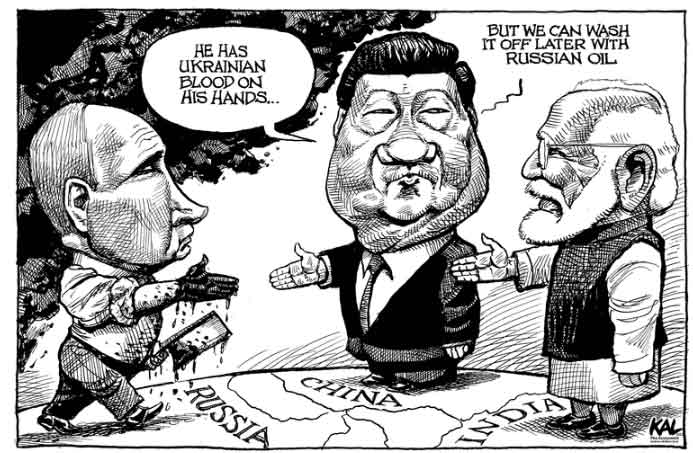
Russian nationals have been arrested in Germany on charges of planning to attack military facilities. English prosecutors claim that Russian agents set fire to a warehouse containing aid for Ukraine. Sweden is investigating alleged Russian-sponsored acts of sabotage. The Czech government accuses Moscow of sabotaging its railways, as well.
Estonia, meanwhile, has reportedly uncovered a host of Russian plots on its soil. Russian ships are suspected of targeting communications cables and wind farms in the North Sea. Now, Moscow may be involved in suspicious fires — including one that engulfed a shopping center — in Poland. The roster of allegations goes on and on.
Russia naturally denies any culpability, but where there is this much smoke — literal or figurative — there is probably some fire. As Prime Minister Kaja Kallas of Estonia has said, Russia seems to be waging a “shadow war” against Europe — a campaign meant to weaken Western support for Ukraine, or at least to punish European countries for providing it. In doing so, President Vladimir Putin is also giving a preview of the hyper-resentful, asymmetrically aggressive Russia that will emerge from the current war.
No matter what losses Moscow suffers in Ukraine, no matter where the front lines are when the fighting ends, Russia will still occupy one-eighth of the land on earth, and it will still be one of the most important geopolitical actors. Its behavior will shape the security environment in Europe and far beyond.
Many European governments fear Putin is already envisioning new wars: Denmark's defense minister announced that Russia could attack one of the North Atlantic Treaty Organization's European members within three to five years.
Don't dismiss this scenario entirely. Putin is militarizing Russian society and raising defense production to record levels. If he doubted America's commitment to Europe — perhaps because it had once again elected a president who continually derides NATO — he might be tempted to conduct a smash-and-grab attack, perhaps against the Baltic States, to show just how hollow the alliance had become. Short of that, however, a conventional Russian assault on Europe seems unlikely.
Putin has had to mobilize so much manpower and materiel because his army has suffered such brutal attrition in Ukraine. Even after this war ends, Russian forces will have to occupy whatever Ukrainian territory they still control. Moreover, so long as the US remains committed to NATO, Putin knows that an attack on its members risks starting a war he would ultimately lose. More likely, then, is a thoroughly roguish, occasionally violent Russia — but one that relies mainly on asymmetric tactics to weaken an alliance he cannot beat head-on.
Putin certainly has the motive. He contends that the West is already waging a “real war,” meant to humiliate Russia and destroy his regime. He has used the current war to radicalize his country — to purge it of liberal, moderate elements, to indoctrinate teenagers and even young children in extreme nationalism, to create a system geared toward confrontation with the outside world. He has accumulated vast reserves of animosity toward the countries that are helping Ukraine kill Russian troops. And he has many unconventional means of seeking revenge.
Russia has long sponsored covert acts of destruction in Europe: As far back as 2014, Russian agents apparently sabotaged Czech ammunition dumps containing arms bound for Ukraine. His regime has cultivated criminals and radicals as proxies; it has weaponized migration by pushing refugees across the borders into Europe. It has used nominally civilian capabilities, such as fishing trawlers, to attack valuable undersea infrastructure.
For years, Moscow has also sponsored attempted coups and assassination plots in countries from Montenegro to Germany. At times, it has simply moved, or threatened to move, its land and sea borders with neighboring states. Add in Russia's well-honed political warfare capabilities — influence operations, cyberattacks and other means of meddling — and Putin has everything he needs for a low-intensity assault against the West.
To be clear: This isn't just some harassment campaign, some fit of geopolitical pique. These tactics erode Western countries' sovereignty and unsettle their politics.
Most fundamentally, they demonstrate that NATO's defense guarantees can't necessarily stop Russia from perpetrating occasionally violent, if quasi-disguised, acts of aggression in Europe. And here, high-end capabilities bolster below-the-threshold tactics: Russia's nuclear arsenal, which Putin habitually brandishes, helps deter a more muscular Western response.
Two years ago, I wrote that Russia might become a “Tehran on the Volga” — a weakened but increasingly militant regime that uses proxies and other non-traditional tools. If anything, this sort of Russia is now taking shape even more rapidly than I expected.
NATO will have to continue rearming against an avowedly revisionist, highly mobilized Russia, if only to ensure that full-blown confrontation with the alliance remains a very bad bet. Yet it must also prepare for a long struggle in the shadows, in which a wounded Russia finds creative ways of harrying its foes. That sort of cold war will be challenging enough — even if the West can keep its confrontation with Putin from turning hot.
(COMMENT, BELOW)
Brands is a Bloomberg Opinion columnist, the Henry Kissinger Distinguished Professor at Johns Hopkins University's School of Advanced International Studies, and senior fellow at the Center for Strategic and Budgetary Assessments. Most recently, he is the co-author of "The Lessons of Tragedy: Statecraft and World Order."
Previously:• 04/16/24 War in Gaza is a perfect opportunity for Iran's nuclear push
• 04/19/23 Republicans will regret not helping Ukraine
• /04/19/23 What went wrong in the Afghan pullout? Biden's not saying
• /02/22/23 Ukraine's future is NOT in NATO
• /11/29/22 Ukraine's victories may become a problem for the US
• /08/04/22 Al-Zawahri killing was a great success of a bygone era
• /06/17/22 Sweden's faux neutrality couldn't survive Putin's Ukraine war
• /06/17/22 The coming global chaos?
• /06/02/22 The world does NOT need a more restrained America
• /10/01/21 Afghanistan debacle aside, US isn't done with nation-building
• /09/02/21 The Afghanistan war wasn't a cynical misadventure
• /11/11/19: How Russia could force a nuclear war in the Baltics
• /01/15/19: America's Cold Warriors hold the key to handling China
• /12/10/18: Putin's Saudi bromance is part of a bigger plan
• /11/12/18: Three reasons to fear another 'Great War' today


 Contact The Editor
Contact The Editor
 Articles By This Author
Articles By This Author